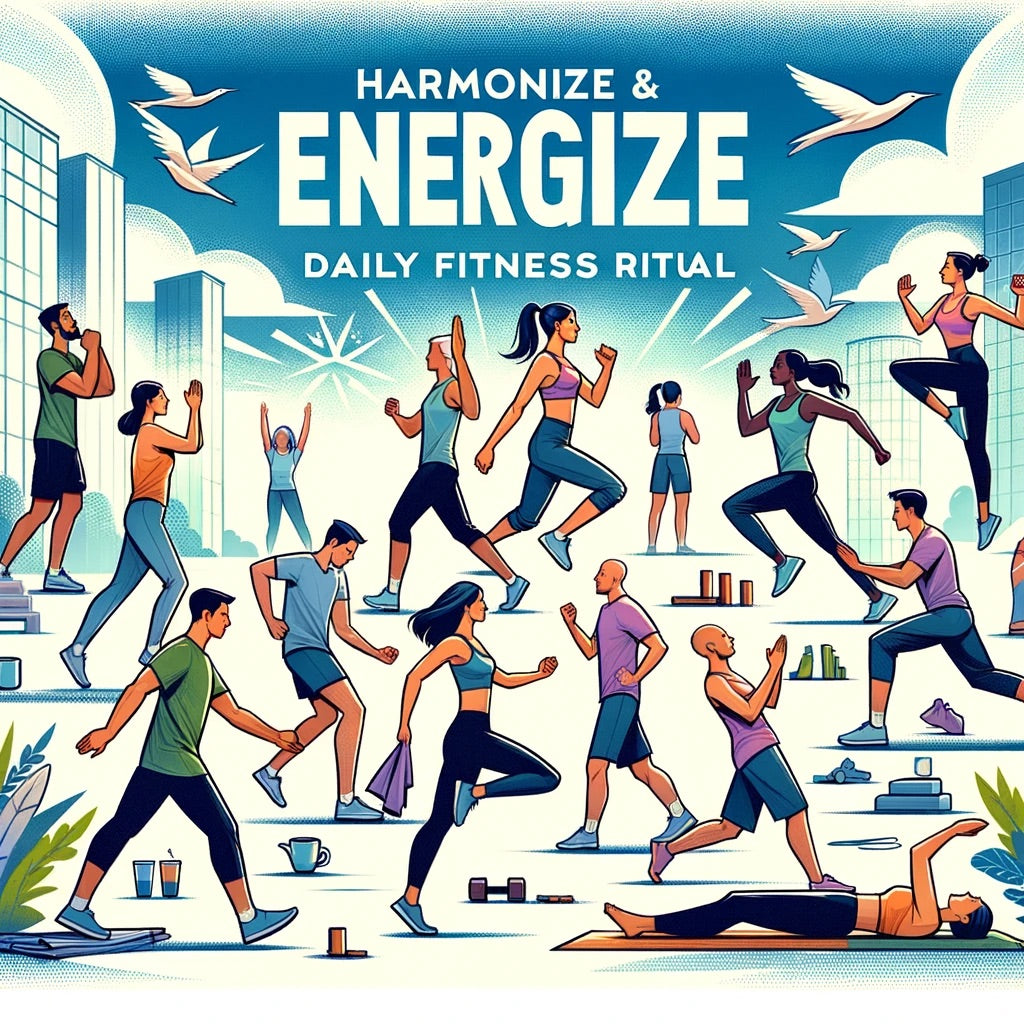Inspirational Daily Habits

Red Lights
HABIT
Lighting Adjustments: Install red lights or dim your indoor lighting to predominantly expose yourself to red light, especially during the evening hours.
REASONING & BENEFITS
Circadian Rhythm Regulation: Red light has a minimal effect on the circadian rhythm compared to blue light, which can disrupt sleep patterns by inhibiting melatonin production.
Improved Sleep Quality: Using red light in the evening supports the body's natural preparation for sleep, leading to improved sleep quality.
Healthier Sleep-Wake Cycle: This adjustment helps maintain a healthy sleep-wake cycle, essential for overall well-being and daily functioning.
Reduced Eye Strain: Red light is easier on the eyes, reducing strain from excessive exposure to bright and blue light.

Intermittent Fasting
HABIT
Intermittent Fasting Routine: Adopt an intermittent fasting regimen, aiming for a fasting window of 14 to 20 hours daily, adjusted according to personal needs and circumstances.
REASONING & BENEFITS
Weight Management: Fasting helps regulate the balance of energy intake and expenditure, supporting weight loss or maintenance efforts.
Improved Metabolic Health: This practice can enhance insulin sensitivity, reduce inflammation, and lower the risk of metabolic diseases.
Increased Longevity: Research suggests intermittent fasting may contribute to longer lifespan by promoting cellular repair processes.
Mental Clarity: Many report improved focus and cognitive function during fasting periods due to the shift in energy utilization from glucose to ketones.

Sunlight
HABIT
Morning Sunlight: Begin your day by spending 15 minutes outside, allowing the morning sunlight to directly reach your eyes. This natural light exposure helps reset your internal clock, or circadian rhythm, promoting better sleep at night and increasing alertness during the day.
Midday Sunshine: Dedicate another 15 minutes to sun exposure around midday. The sun's position at this time maximizes the production of Vitamin D in your body, essential for bone health, immune function, and mood regulation.
Sunset Viewing: Conclude your day with 15 minutes of sunset light. This practice not only has calming effects on the mind, easing into the evening, but also signals your body to prepare for rest, enhancing the quality of sleep.
Daily Sunlight on Cloudy Days: Extend sunlight exposure to 20-30 minutes thrice daily: morning, midday, and late afternoon.
REASONING & BENEFITS
Enhances Skin and Healing: Sunlight boosts vitamin D for skin health and accelerates wound healing.
Balances Hormones: Improves sleep, mood, and stress by regulating key hormones.
Prevents Dementia: Sunlight exposure is linked to reduced dementia risk through better sleep and hormone regulation.
Backed by Science: Phototherapy, including red light therapy, supports vision and overall health, with evidence from over a century, including a Nobel Prize.

Mirror High Fives
HABIT
Practice giving yourself a high five in the mirror as often as you like each day.
REASONING & BENEFITS
Boosts Self-Esteem: This simple gesture can significantly lift your spirits by creating a moment of self-recognition and accomplishment.
Improves Mood: The act of a self-high five releases endorphins, promoting a positive mood and reducing stress.
Strengthens Self-Perception: Regularly celebrating yourself in this way reinforces a positive self-image and confidence.
Encourages Self-Acceptance: It acts as a reminder to appreciate and accept yourself, fostering an attitude of self-love and respect.

Grounding
HABIT
Daily Grounding: Spend 20-40 minutes grounding your feet or body each day.
REASONING & BENEFITS
Reduces Inflammation: Grounding, or earthing, involves direct contact with the earth's surface electrons, which have antioxidant effects that reduce inflammation.
Lowers Stress: This practice can also decrease stress levels by calming the nervous system, promoting a state of relaxation.
Improves Sleep: Regular grounding can improve sleep patterns, further reducing stress and supporting overall well-being.

Meditation
HABIT
Daily Meditation: Dedicate 30 minutes to meditation each day, focusing on observing your thoughts without engaging or identifying with them. Utilize this time as an opportunity to refine your programming skills.
REASONING & BENEFITS
Enhanced Focus: Meditation sharpens your ability to concentrate, directly benefiting programming tasks that require sustained attention.
Boosted Creativity: Observing thoughts passively can inspire creative solutions, enhancing your ability to tackle complex programming challenges innovatively.
Improved Problem-Solving: The clarity and calmness cultivated through meditation improve problem-solving skills, essential for debugging and optimizing code.
Emotional Regulation: This practice aids in managing stress and anxiety, common in programming, leading to a more productive and fulfilling coding experience.

Cold Showers
HABIT
Cold Showers: Take a 5-minute cold shower (below 70°F) three times per week.
REASONING & BENEFITS
Improves Circulation: Cold showers boost blood circulation, enhancing cardiovascular health by encouraging blood to surround our organs.
Mental Resilience: The practice trains the mind to tolerate discomfort, building mental strength and resilience.
Boosts Immunity: Increased circulation can also stimulate white blood cell production, boosting the immune system.
Enhances Mood: Cold exposure releases endorphins, the body’s natural mood elevators, combating feelings of depression.

Vegetables First
HABIT
Vegetable First Strategy: Make it a habit to eat vegetables before the rest of your meal, especially before any sugary foods, to moderate blood sugar levels.
REASONING & BENEFITS
Blood Sugar Regulation: Consuming vegetables first helps slow down glucose absorption into the bloodstream, preventing sudden spikes in blood sugar levels.
Gut Health: Vegetables are rich in fiber, which aids in digestion and provides a protective lining for the gut, enhancing overall gut health.
Satiety and Weight Management: Starting with vegetables can also increase feelings of fullness, reducing the likelihood of overeating high-calorie foods later in the meal.
Nutrient Absorption: Eating vegetables first ensures you're prioritizing nutrient-dense foods, supporting your overall nutritional intake.

Hydrate
HABIT
Men: Consume 125 ounces of water daily.
Women: Consume 91 ounces of water daily.
REASONING & BENEFITS
Hydration Needs: These amounts are tailored to the average hydration needs of men and women, considering differences in body composition and metabolic needs.
Health and Well-Being: Proper hydration supports various bodily functions, including maintaining temperature, removing waste, and lubricating joints.
Enhanced Performance: Adequate water intake is crucial for optimal physical and cognitive performance, preventing dehydration that can lead to tiredness, confusion, and other health issues.
Skin Health: Regular and sufficient water consumption can also improve skin health, contributing to a clearer, more hydrated complexion.

Switch Hands, Boost Your Brain
HABIT
Incorporate the use of your non-dominant hand for daily tasks such as brushing your teeth, holding a water bottle, picking up items, or navigating a computer mouse. This small change can make a routine day a brain-enhancing activity.
REASONING & BENEFITS
Engaging the Non-Dominant Hand stimulates neural connections within the brain, particularly enhancing the communication between both hemispheres. This can lead to improved manual dexterity and cognitive abilities. Research suggests that ambidextrous actions can enhance brain plasticity, which involves the brain's ability to change and adapt as a result of experience—very useful in aging populations for maintaining brain health.
Moreover, using the non-dominant hand challenges the brain to complete familiar tasks in new ways, potentially improving problem-solving skills and creativity. It can also help to balance muscular function and coordination on both sides of the body, promoting more symmetrical physical development.
Scientific Insight:
Studies, such as those published in "Neuropsychologia," have shown that individuals trained to use their non-dominant hand exhibit increased activity in both sides of their brains, which can lead to heightened cognitive processing speed and an improved ability to learn new skills.
By integrating this habit into your daily routine, you're not just altering a simple physical activity; you're embarking on a journey to enhance your brain's capacity and health in a playful and engaging way.

Alternate & Balance: Sit-Stand Routine
HABIT
Adopt a dynamic routine by alternating between sitting and standing every 30 minutes during an 8-hour workday. Aim for at least 4 hours of standing or moving. Extend this habit beyond work by staying active every 45 minutes, whether it's a short walk, doing chores, or simply stretching.
REASONING & BENEFITS
Optimizing Movement Throughout the Day enhances physical health and increases mental alertness. This practice reduces the risks associated with prolonged sitting, such as cardiovascular disease, diabetes, and poor mental health.
Scientific Insight:
Research indicates that frequent transitions between sitting and standing can improve posture, increase blood flow, and boost metabolism. A study published in the American Journal of Epidemiology suggests that an active routine that includes standing and light activity can significantly decrease the risk of premature mortality, particularly from cardiovascular diseases.
Furthermore, maintaining regular movement helps to sharpen concentration and sustain energy levels, which can lead to more productive and creatively fulfilling work sessions. This habit not only fosters physical health but also enhances cognitive function by keeping the brain engaged and oxygenated.
Long-Term Benefits:
Incorporating standing and moving intervals into your daily routine helps condition your body to naturally crave activity, reducing sedentary tendencies and promoting long-term wellness. This habit is especially beneficial for those who work in sedentary job roles, providing a simple yet effective strategy to keep the body active and the mind alert.

Breathe Right: Master Nasal Breathing
HABIT
Embrace nasal breathing as your primary breathing method throughout the day. Make a conscious effort to keep your mouth closed and breathe through your nose during all daily activities and continue this practice while sleeping.
REASONING & BENEFITS:
Fundamentals of Nasal Breathing: Nasal breathing is more than a habit; it's a return to the body’s natural breathing method. Unlike mouth breathing, it enhances oxygen uptake and filters out airborne impurities. It also helps maintain moisture in the airways, making breathing easier and more efficient.
Scientific Insight:
Research highlights that nasal breathing plays a crucial role in maintaining optimal blood oxygen and carbon dioxide levels, which is vital for organ function and energy levels. Studies have shown that it can also improve lung mechanics, making breathing less laborious and more energy-efficient.
Benefits During Sleep:
Continuing nasal breathing during sleep can significantly improve sleep quality. It helps reduce snoring and prevent sleep disturbances like sleep apnea, leading to a more restorative sleep cycle.
Spiritual and Mental Health Enhancements:
Nasally-induced breathing is closely tied to practices in yoga and meditation, where it is used to calm the mind and align the body and spirit. It supports mindfulness and meditation practices by regulating breathing patterns, which can reduce stress and anxiety levels.
Long-Term Health Gains:
Regular nasal breathing can lead to long-term health improvements, including enhanced cognitive function, better cardiovascular health, and a strengthened immune system.
By adopting nasal breathing as a conscious habit, you not only improve your physical health but also enhance your mental and spiritual well-being, fully aligning with the holistic health goals of your e-commerce platform.

Wellness Through Motion
HABIT
Commit to a balanced exercise routine consisting of 30 minutes of moderate activity each day. Choose activities that increase your heart rate and improve your strength, such as brisk walking, light jogging, yoga, or bodyweight exercises. Aim to incorporate these sessions into your morning or evening routine to establish a consistent practice.
REASONING & BENEFITS
Optimal Exercise for Holistic Health: Engaging in 30 minutes of moderate exercise daily can significantly boost cardiovascular health, enhance mood, and increase energy levels. This habit supports not just physical fitness but also mental and emotional well-being.
Scientific Insight:
According to guidelines from health authorities like the CDC and the World Health Organization, adults should aim for at least 150 minutes of moderate-intensity aerobic activity per week, coupled with muscle-strengthening activities on two or more days a week. Regular physical activity is proven to reduce the risk of chronic diseases such as heart disease, type 2 diabetes, and cancer.
Spiritual and Mental Benefits:
Exercise is not just a physical activity; it's a spiritual uplift. It releases endorphins, known as the body's natural painkillers, which can improve mood and decrease feelings of depression, anxiety, and stress. Incorporating mindfulness and yoga can enhance this effect, aligning body, mind, and spirit.
Long-Term Commitment:
By making exercise a daily habit, you cultivate discipline, resilience, and a sense of achievement. Regular physical activity can also improve sleep patterns and provide a natural energy boost, enhancing your overall quality of life.
This habit is designed to integrate seamlessly into your daily routine, providing a comprehensive approach to health that supports your store’s mission of promoting a holistic lifestyle.

Organic Clothing & Materials
HABIT
Steer clear of synthetic fabrics due to their potential to release toxic chemicals. Opt for organic and natural fibers like wool, cotton, and linen instead.
REASONING & BENEFITS
Reduced Chemical Exposure: Synthetic fabrics can leach chemicals, especially when exposed to heat or sunlight, posing health risks. Organic materials offer a safer alternative.
Healthier Body Frequency: Research suggests natural fibers like wool and linen may enhance the body's frequency, supporting overall health.
Environmental Impact: Choosing organic and natural clothing reduces environmental pollution and supports sustainable practices.
Skin-Friendly: Organic fabrics are gentler on the skin, reducing irritation and allergies, making them ideal for sensitive skin.

Morning Breathes
HABIT
Deep Breathing Routine: Engage in 30 deep breaths upon waking or while engaging in your morning sunlight gazing.
REASONING & BENEFITS
Enhanced Oxygen Intake: This practice significantly increases oxygen intake, rejuvenating the body and brain after sleep.
Mental Clarity: The influx of oxygen improves cognitive functions, leading to greater mental clarity and focus throughout the day.
Lung Capacity: Regular deep breathing exercises expand lung capacity and improve respiratory health.
Stress Reduction: This breathing technique also serves as a form of meditation, reducing stress levels and promoting a sense of calm.

Sleep Environment
HABIT
Sleep Environment: Create a sleep environment of absolute darkness and silence to facilitate optimal rest and recovery.
REASONING & BENEFITS
Sensory Rest: The brain's need for sensory rest is crucial for deep sleep phases, where recovery and memory consolidation occur.
Enhanced Sleep Quality: Eliminating light and noise distractions significantly improves sleep quality, allowing the brain to fully relax and enter restorative sleep stages.
Improved Health: Quality sleep supports physical health, including heart health, weight management, and stress reduction.
Cognitive Benefits: Adequate rest enhances cognitive functions such as concentration, decision-making, and creativity.

Avoid Plastics
HABIT
Avoid Plastic Containers: Refrain from using plastic containers for eating and drinking due to microplastic contamination risks. Prefer stainless steel water bottles and non-plastic utensils.
REASONING & BENEFITS
Health Preservation: Minimizing exposure to microplastics, which can leach from containers into food and beverages, helps reduce potential health risks associated with their accumulation in the body.
Environmental Impact: Choosing stainless steel and non-plastic alternatives reduces plastic waste and pollution, contributing to environmental conservation.
Durability and Safety: Stainless steel and non-plastic options are more durable and often safer, as they don't contain chemicals like BPA found in some plastics.
Long-Term Savings: Investing in reusable, non-plastic containers can offer long-term savings over disposable plastic options.

Install Water Filters
HABIT
Water Filtration System: Install a drinking water filter and a shower filter at home.
REASONING & BENEFITS
Reduced Contaminants: Water filters significantly reduce harmful contaminants, including chlorine, heavy metals, and pesticides, that can affect health and skin condition.
Enhanced Hydration: Filtered drinking water can taste and smell better, encouraging more consumption and improving hydration.
Skin and Hair Health: A shower filter can protect skin and hair from drying and irritation caused by chlorinated water, leading to softer skin and healthier hair.
Long-Term Health Benefits: Regular use of filtered water can contribute to long-term health improvements by reducing exposure to potentially harmful substances.

Consume Olive Oil
HABIT
Daily Olive Oil Intake: Make it a habit to consume a spoonful of extra virgin olive oil every day.
REASONING & BENEFITS
Rich in Antioxidants: Extra virgin olive oil is packed with powerful antioxidants, which can protect the body against inflammation and reduce the risk of chronic diseases.
Heart Health: Its monounsaturated fats are known to support heart health by lowering bad cholesterol levels and increasing good cholesterol.
Digestive Benefits: Olive oil aids in the digestive process and has been shown to promote gut health.
Enhanced Nutrient Absorption: Consuming olive oil can improve the absorption of fat-soluble vitamins (A, D, E, and K), enhancing overall nutrition.

Restrict Eating Prior to Bedtime
HABIT
Pre-Bedtime Fasting: Cease calorie intake 2 to 3 hours before going to sleep.
REASONING & BENEFITS
Improved Digestion: Not eating before bedtime allows the digestive system to rest and reduces the risk of discomfort and indigestion.
Enhanced Sleep Quality: Fasting before sleep can prevent sleep disturbances caused by digestion and contribute to a deeper, more restful sleep.
Weight Management: This practice can help regulate the body's use of stored fat and glucose, aiding in weight management.
Stabilized Blood Sugar Levels: It helps maintain stable blood sugar levels overnight, important for overall metabolic health.

